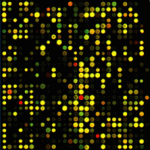Genomics
|
29 october 2014 05:34:20 |
| Benchmarking mutation effect prediction algorithms using functionally validated cancer-related missense mutations (Genome Biology) |
|
Tweet Background:
Massively parallel sequencing studies have led to the identification of a large number of mutations present in a minority of cancers of a given site. Hence, methods to identify the likely pathogenic mutations that are worth exploring experimentally and clinically are required. We sought to compare the performance of 15 mutation effect prediction algorithms and their agreement. As a hypothesis-generating aim, we sought to define whether combinations of prediction algorithms would improve the functional effect predictions of specific mutations.
Results:
Literature and database mining of single nucleotide variants (SNVs) affecting 15 cancer genes was performed to identify mutations supported by functional evidence or hereditary disease association to be classified either as non-neutral (n?=?849) or neutral (n?=?140) with respect to their impact on protein function. These SNVs were employed to test the performance of 15 mutation effect prediction algorithms. The accuracy of the prediction algorithms varies considerably. Although all algorithms perform consistently well in terms of positive predictive value, their negative predictive value varies substantially. Cancer-specific mutation effect predictors display no-to-almost perfect agreement in their predictions of these SNVs, whereas the non-cancer-specific predictors showed no-to-moderate agreement. Combinations of predictors modestly improve accuracy and significantly improve negative predictive values.
Conclusions:
The information provided by mutation effect predictors is not equivalent. No algorithm is able to predict sufficiently accurately SNVs that should be taken forward for experimental or clinical testing. Combining algorithms aggregates orthogonal information and may result in improvements in the negative predictive value of mutation effect predictions. |
| 192 viewsCategory: Bioinformatics, Genetics, Genomics |
 MSEA: detection and quantification of mutation hotspots through mutation set enrichment analysis (Genome Biology) MSEA: detection and quantification of mutation hotspots through mutation set enrichment analysis (Genome Biology)Genetic adaptation of the human circadian clock to day-length latitudinal variations and relevance for affective disorders (Genome Biology) 
|
| blog comments powered by Disqus |
MyJournals.org
The latest issues of all your favorite science journals on one page
The latest issues of all your favorite science journals on one page



